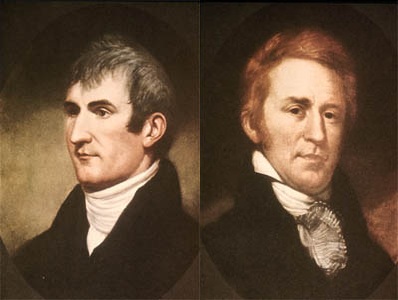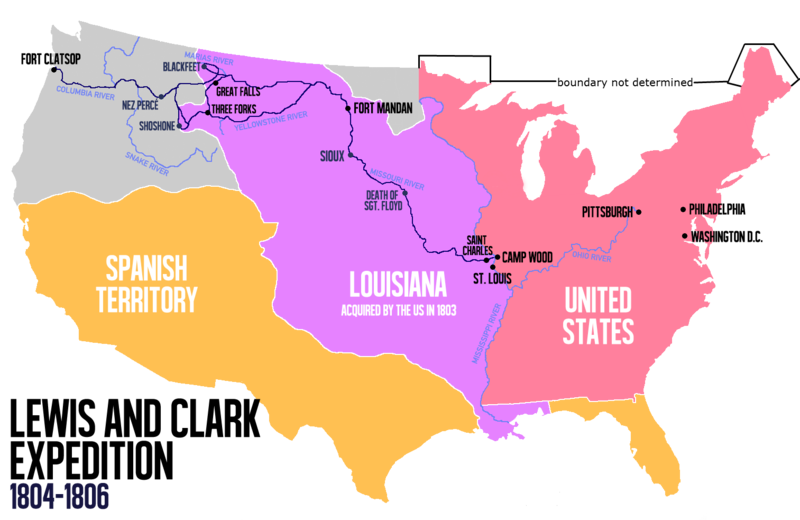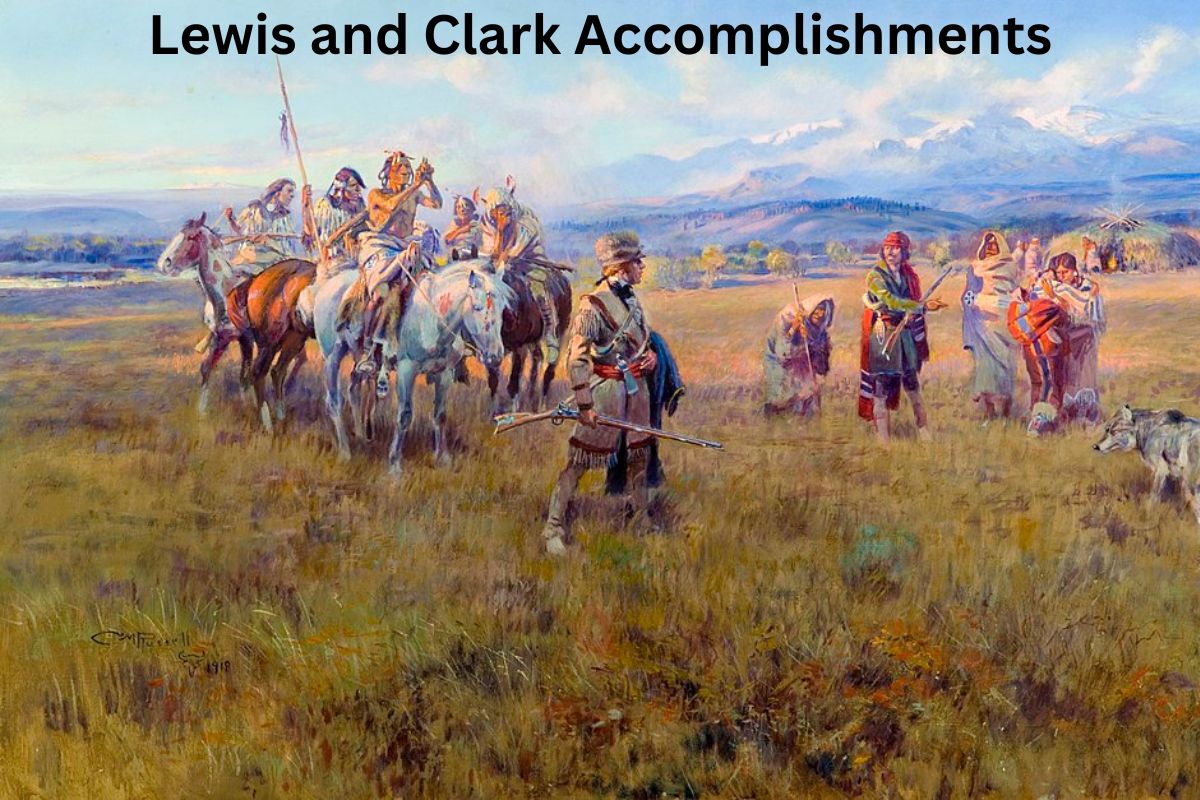Lewis and Clark, Meriwether Lewis and William Clark, are renowned for their remarkable expedition across the Western territories of the United States from 1804 to 1806.
Commissioned by President Thomas Jefferson, their Corps of Discovery Expedition aimed to explore and map the newly acquired Louisiana Purchase.
Their journey covered over 8,000 miles, charting uncharted lands, forging diplomatic relations with Native American tribes, gathering scientific data, and paving the way for future westward expansion.
Lewis and Clark’s accomplishments not only expanded geographical knowledge but also contributed to natural history, enhanced national security, and inspired future explorers.
Their expedition remains a pivotal moment in American history, showcasing the spirit of adventure, discovery, and the quest to expand the nation’s horizons.
Accomplishments of Lewis and Clark
1. Completed the Corps of Discovery Expedition
Lewis and Clark successfully led the Corps of Discovery Expedition, which was commissioned by President Thomas Jefferson in 1803. The primary objective of the expedition was to explore and map the newly acquired Louisiana Purchase territory.
Over the course of their two-year journey from 1804 to 1806, Lewis and Clark, along with their team of skilled explorers, covered vast stretches of uncharted land, overcoming numerous challenges and obstacles along the way.
Their unwavering determination, leadership, and resourcefulness enabled them to reach the Pacific Ocean, completing their mission and leaving an indelible mark on American history.

2. Charted new territories
One of the major accomplishments of Lewis and Clark was their meticulous mapping and charting of the western territories they explored. The expedition extensively documented the geography, rivers, mountains, and landmarks of the region.
They carefully recorded latitude and longitude readings, sketched detailed maps, and made notes on topography and navigation.
Their accurate maps and geographical descriptions of the territories opened up a wealth of knowledge about the previously unknown areas, aiding future explorers, settlers, and the expanding nation.
3. Established diplomatic relations with Native American tribes
Throughout their expedition, Lewis and Clark encountered numerous Native American tribes, establishing crucial diplomatic relations with them. The explorers aimed to establish peaceful and mutually beneficial relationships with the indigenous peoples they encountered.
They engaged in dialogue, held council meetings, and exchanged gifts as a gesture of goodwill. By demonstrating respect, understanding, and a willingness to learn from the Native American cultures, Lewis and Clark laid the groundwork for future interactions between the United States government and Native American tribes.
These diplomatic efforts helped to promote peace, facilitate trade, and fostered a better understanding between different cultures during a time of territorial expansion.
4. Gathered scientific data
Lewis and Clark’s expedition had a strong focus on scientific inquiry. They meticulously documented the natural history of the territories they traversed, collecting samples of plants, animals, and minerals along the way.
They described and classified numerous species, providing valuable scientific contributions to the understanding of Western flora and fauna. The expedition’s scientists, including naturalists like Meriwether Lewis and botanist John Bradbury, diligently recorded observations on geology, meteorology, astronomy, and ethnography.
Their scientific data became the basis for further research and study, expanding knowledge in various scientific fields.

5. Contributed to natural history
Lewis and Clark’s expedition significantly contributed to the field of natural history. They encountered and documented numerous previously unknown plant and animal species, describing them in detail and collecting specimens for further study.
The expedition’s scientific findings expanded the knowledge of Western ecosystems and biodiversity. Their discoveries included new species of plants such as Lewis’s mock-orange (Philadelphus lewisii) and animals such as the pronghorn antelope (Antilocapra americana).
The expedition’s botanical collections, including specimens of over 200 new plant species, laid the foundation for subsequent botanical research in the Western territories.
6. Expanded knowledge of Native American cultures
As Lewis and Clark traveled through the Western territories, they encountered and interacted with various Native American tribes. They took a keen interest in understanding the cultures, languages, and traditions of these indigenous peoples.
Lewis and Clark made detailed observations and recorded information on the tribes’ social structures, religious practices, hunting techniques, and daily life. Their documentation provided valuable insights into the rich diversity of Native American cultures during that period.
Their expedition’s ethnographic data, including vocabulary lists and descriptions of customs, helped to preserve knowledge about the indigenous peoples of the West and contributed to the understanding of their history and heritage.
7. Pioneered overland travel to the Pacific
One of the significant accomplishments of Lewis and Clark was their successful overland journey to the Pacific Ocean. Prior to their expedition, there were limited routes to travel from the eastern part of the United States to the Pacific coast.
Lewis and Clark, along with their team, blazed a trail through rugged terrain, dense forests, and treacherous rivers, overcoming physical challenges and navigational obstacles.
Their expedition showcased the viability of overland travel across the continent and opened up new possibilities for trade, settlement, and further exploration of the vast Western territories.
8. Opened trade routes
Through their interactions with Native American tribes, Lewis and Clark played a pivotal role in opening up trade routes in the Western territories. The expedition established friendly relations with several tribes, facilitating economic exchanges and creating a foundation for future trade networks.
Lewis and Clark engaged in bartering, exchanging goods and gifts with the indigenous peoples, fostering a spirit of cooperation and commerce.
Their efforts to establish trade relationships with Native American tribes helped to lay the groundwork for the expansion of fur trading posts and other commercial ventures in the West.
9. Enhanced national security
The Lewis and Clark expedition had significant implications for national security during the early 19th century. At the time, the United States was rapidly expanding westward, and foreign powers, such as Britain and Spain, had territorial ambitions in North America.
By exploring and documenting the Western territories, Lewis and Clark provided valuable information about the region’s geographical features, resources, and potential strategic advantages.
Their findings helped the United States government understand the lay of the land, identify potential threats, and develop strategies to secure and protect its interests in the newly acquired territories.
10. Inspired future explorers
The accomplishments of Lewis and Clark inspired generations of future explorers, adventurers, and scientists. Their courageous and ambitious expedition demonstrated the spirit of discovery and exploration that characterized the early exploration of the American West.
Their success in overcoming challenges, documenting the unknown, and pushing the boundaries of human exploration served as an inspiration for subsequent exploratory endeavors. The expedition’s detailed journals, maps, and scientific findings, which were widely disseminated, fueled curiosity and a thirst for exploration, leaving a lasting legacy in the history of exploration.
